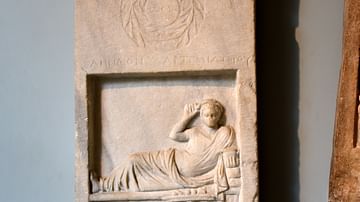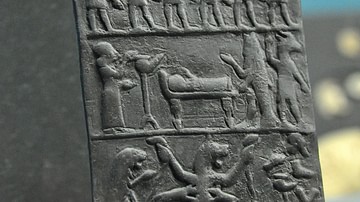Search
Search Results

Video
Mask of Agamemnon, from shaft grave V, grave circle A, Mycenae, c.1550-1500 B.C.E.
Mask of Agamemnon, from shaft grave V, grave circle A, c.1550-1500 B.C.E., gold, 12 inches / 35 cm (National Archaeological Museum, Athens)
Speakers: Dr. Steven Zucker & Dr. Beth Harris

Article
Curses & Fines on Epitaphs
The concept of a curse laid on a tomb or gravesite is best known from ancient Egypt but the practice was quite common in other civilizations of antiquity. The tomb or grave was the eternal home of the physical remains of the deceased to which...

Article
Paul's Journeys and the Mediterranean Trade
Mediterranean trade increased exponentially at the turn of the first millennium. During Rome's zenith, goods of all sorts began to move in all directions. As a common traveler aboard merchant ships, Paul traveled within such a milieu. Tracing...

Article
Caesarea Maritima's Role in the Mediterranean Trade
Caesarea Maritima was located on the eastern coast of the Mediterranean Sea. Built from the ground up in 22-10 BCE by Rome's client king, Herod the Great (r. 37-4 BCE), its location in relation to ship traffic and proximity to historical...

Article
Burial in Ancient Mesopotamia
Burial in ancient Mesopotamia was the practice of interring a corpse in a grave or tomb while observing certain rites, primarily to ensure the passage of the soul of the deceased to the underworld and prevent its return to haunt the living...

Definition
Lend-Lease - The WWII US Aid Programme for Allies
Lend-Lease (sometimes called Lease-Lend) was a programme of financial and material aid given by the United States to its allies during the Second World War (1939-45). Food, weapons, ammunition, and agricultural equipment were amongst the...

Article
Trade in the Roman World
Regional, inter-regional and international trade was a common feature of the Roman world. A mix of state control and a free market approach ensured goods produced in one location could be exported far and wide. Cereals, wine and olive oil...

Article
The Stonehenge Burials
A great deal has been written about why the prehistoric monument of Stonehenge, in Wiltshire, southern England, was constructed. Perhaps it was designed as a temple to the ancestors, an astronomical calendar, a healing centre or a giant computer...

Image
Recreation of Vix Grave
A recreation of the "Grave of the Lady of Vix", from the Museum of Pays Châtillonnais - Trésor de Vix, in France. The "Vix Grave" was an inhumation burial from around 500 BCE, in which a young woman of high social status was interred with...

Article
Norse Ghosts & Funerary Rites
In Norse belief, the soul of the deceased might wind up in any one of a number of afterlife realms. There was Valhalla, the realm of Odin where the dead warriors drank, fought, and told stories, Folkvangr ('the Field of the People'), the...